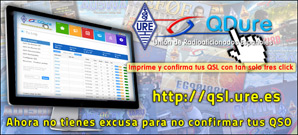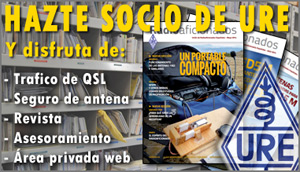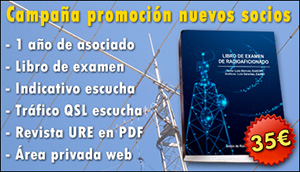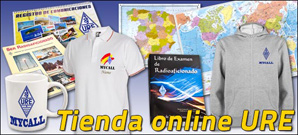
Coverage: The URE HF General Contest Regulations are applicable to all HF contests organised by the Union de Radioaficionades Españoles, which are as follows: EAPSK-63, His Majesty King of Spain CW, His Majesty King of Spain SSB, National CW contest (CNCW), and the Spanish Municipalties Contest (CME). The rules are applicable to all participants, either for individuals or groups, in contests organised by URE, both for Spanish stations includign EA6 EA8 and EA9, and also foreign stations (DX) and will be complementary to the individual rules of each of the different contests. That is to say, participants must take into consideration both the general contest regulations, and also the specific rules of each contest.
Acceptance: The act of sending a log obliges the participant to comply with both the contest rules and the General Contest Regulations, and to accept whatever decision the URE contest committee may take. All information and contest related documents send will become property of URE.
1. Any operator with a valid official licence can take part in the contests organised by URE, and must abide by the current spanish legislation (Ham station regulations) and in the case of foreign stations, the specific legislation in place in their respective countries.
2. Contest bands are 10, 15, 20, 40, 80, and 160m, or in those cases specifically indicated ffor each contest, within the IARU recommended segments click here. WARC bands may not be used, nor bands assigned on a secondary basis. Established band edges are to be respected, taking into consideration the bandwidth used on each mode, with a view to not transmitting out of band.
3. The maximum power allowed is 1000w for high power EA stations. For DX stations, the maximum power allowed is the maximum legal limit according to the DX stations local regulations. For Low power and QRP the limit is the same both for EA and DX stations: up to 100w for low power, and up to 5w for QRP. Power is measured at the active amplifier output(s). Transmittign signals wih excessive bandwidth (e,g, Splatter, key clicks) or harmonics on other bands is considered unsportsmanlike and can be a motive for disqualification.
4. The EA stations operating in QRP categories may not add /QRP to the end of their callsign on the air, however they must indicate it in the contest log if they finally participate in this category.
5. Each operator can only use one callsign during a contest. The callsigns noted in the log should be the ones interchanged during the contest QSO.
6. For a QSO to be considered valid, both stations should copy the signal report and contest Exchange sent/received, without the assistance of third parties, and note all the details in the contest log. All communication should be exclusively by radio. Crossband, repeater, digipeater, node, and satellite contacts, are not permitted.
7. Unique qsos are not valid. Minimum numbers of QSOs required are established in the specific rules of individual contests, and those rules should be observed.
8. Duplicate contacts in a log will not be penalised. They do not need to be elimiated from the lo, and the log checking program will determine which one is valid.
9. The multi category stations are allowed to have only one signal in each band at any one time. The multi-transmitter stations are formed by connected network stations, or remote as well, using latest technologies to assure the previous law.
10. All radiating systes (antennas) and radios should be installed within a 500m radius. This means that remote reception (RX) is not allowed, since it is not within the 500m limit. Contacts may not be made using SDR webs via internet to listen to the contacted station.
11. Remote operation is allowed. Monooperator stations should use the same station, remote or local, during all contest.
12. Operators in the monooperator multiband category can make QSO son all contest bands and these will count towards their final score. They may not have more than one signal simultaneous on air at the same time, either on the same band or on different bands, this being a motive for disqualification. Mono operator operation is considered when only one operator does all the transmitting and receiving, and looking for QSOs, through the whole contest.
The EA participants who use a callsign with a one letter suffix, issued for competition purposes, should indicate their own personal callsign in the log.
13. Monooperators are allowed to use SO2R but should use hardware which ensures that transmission cannot be made twice on the same band at the same time since this is a motive for disqualification.
14. A station operating in a monoband category may make contacts on other bands, but these contacts will not be taken into consideration when calculating the final monoband score. For the contacts made on other bands to count as valid for the other stations, the minimm amount of qsos should be made as determined in each contest.
15. In CW contests and exceptionally, automatic CW decoding systems may be used, when physically connected to the station and used by the operator.
16. The use of the cluster is allowed in all categories. None of the following are permitted: Self spotting, masked spots, requesting third parties to spot, any announcement made by operators of stations participating in multioperator categories, either by radio, telephone, social media, whatsapp, telegram, or any other mode not explicitly mentioned in these General Contest Regulations, either before or during a contest.
SELF SPOT: is when a station announces their transmit frequency during a contest, by any of the aforementioned means.
MASKED SPOT: is when a station uses a third party callsign to announce their transmit frequency, either on the cluster, social media, mailing lists, foru,s, whatsapp, telegram, etc.
UNSPORTSMANLIKE BEHAVIOUR. Is the publication of details relevant to contacts or requesting details to other users, which help them to complete a contact either on their own, or through a third party, either by email, social media, mailing lists, forums, whatsapp, telegram, etc.
It is also considered to be unsportsmanlike behaviour if a station participating in any of the contests regulated by these regulations, repeatedly spots one individual station (15 spots or more) with the aim of benefitting the spotted station.
It will also be considered unsportsmanlike conduct to request that a list be classified in a power category that does not conform to the provisions of point 3 of this RGC. The Spanish Radio Amateurs Union Contest Committee may request details of their radiant system, equipment, operating technique and other details by email from the participants when it deems appropriate. If this information is not provided within the required period, the list will be reclassified to CHECKLOG.
Also, any station participating in any of the contests under these General Contest Rules, will be considered as operating in an unsportsmalike way if they massively spot another station, either personally or covertly, with a view to giving said station an advantage.
It is also considered to be unsportsmanlike behaviour if a station participating in any of the contests regulated by these regulations, repeatedly spots one individual station (15 spots or more) with the aim of benefitting the spotted station.
17. Participation from mobile stations is permitted, although operation must always be while parked, never while in movement.
18. Stations taking part should send their logs in a maximum of 15 days after the contest finishes, and should do so via the URE contest web. In exceptional and justified cases, stations may request an extension to the time limit within the 15 days by email to hf@ure.es
19. Logs should be sent in Cabrillo format used in all major contests.
Once the deadline for logs has expired, each participant will be sent the provisional results, together with the UBN (error report) in order for each operator to verify the errors and make any possible claim within 5 days, by email to hf@ure.es. UBns are not sent for the purposes of log correction, but in order for each participant to see where they made mistakes in order for them to correct those mistakes for future contests.
During the period of log submittal, operators may send their logs as many times as they require, including even changing category. Once the log submittal period is over, categories may not be changed, except for justified causes which may be submitted to hf@ure.es for approval.
20. When a station is in a potential prize-wining situation, the organization may request the log with exact frequencies (KHz) and not only the band, with a view to checking.
21. Participation in the contests implies full acceptance of the rules, of the decisions taken by the contest committee, and of the following:
1. Accepting and authorising that when a contest log is sent, URE may make it wholly public, either in the “Radioaficionados” magazine, on the URE website or in whatever form is deemed appropriate, and for contacts between participants to be checked and verified.
2. When sending photos of participation, URE is authorised to publish them in Radioaficionados magazine, on the URE website, or wherever URE deems appropriate.
3. Results and diploma downloads are to be made public in Radioaficionados magazine, on the URE website, or wherever URE deems appropriate.
4. With a view to pursuing unsportsmanlike actions and to maintain Fair Play in the URE sponsored contests, the contest committee may request either internally in URE or externally, whatever information they may consider necessary to investigate conduct which may be unsportsmanlike, by requesting cluster connection information or any other form that may be considered necessary.
22. When the organization sees behaviour which whilst not explicitly irregular may be considered unethical or unsporstmanlike, the contest committee reserves the right to reclassify the log as a control log. This decision would be sufficiently meditated and made known to the operator or operators before any final results were published.
23. If the contest committee receives a complaint from a participant regards other participants, these other participants will be notified and asked for their allegations. Either party may be requested to submit suppoting documentation or other proof, and once studied, the committee will take whatever decision they believe to be correct.
24. If after final results are published the contest committee were to be made aware of irregular conduct or of rules having been broken by participants, they may decide to reclassify the entry as a check log, or disqualify them. This might mean having trophies or diplomas withdrawn and presented to others instead.
25. In case a participants log is reclassifed as a check log or is disqualified, any endorsments acheived through GDURE in that contest will be lost.
26. Repeated antisportsmanlike conduct by one or more participants may mean systematic anual disqualification in annual periods and that their logs are not taken into consideration in future contests.
27. In case of a tie for points by several contesters in a certain contest/category the tiebreaker will be done counting how many times to the same contest, independently of the category, on the previous five editions who has more often participated. If the tie is still on using the previous law the tiebreaker will be the number of participations on the previous five years in all contests of the HF Championship.





















